Looking to find high potential target keywords? Here are 7 free keyword suggestion tools to help you discover untapped keywords that your competition doesn’t know.
Read on to get the right keyword suggestion tool that fits your business.
Keyword research is the foundation of any winning SEO.
As SEO practitioners, you need to constantly look out for keyword opportunities to expand your website ranking portfolio. This will help widen your organic search footprint and drive more traffic to your website.
A key area to growth is discovering new keyword suggestions and achieving that we can never rely on just a single keyword research tool.
Most marketers are dependent on Google Keyword Planner and simply target similar keywords rather than look for the most strategic keywords with the highest traffic potential. However, this has to change if you are looking to outrank your competitors.
So if you are determined to find your winning keywords but don’t have the additional budget for paid alternatives, rest assured we have got you covered.
This post will guide you on how to do keyword research with a complete list of free and freemium keyword tools to help you discover more keyword suggestions.
Why Use Keyword Suggestion Tool?
You need more information to make smarter keyword decisions.
Relying on Google Keyword Planner is not enough, especially since the tool doesn’t show the exact search volume or keyword trends.
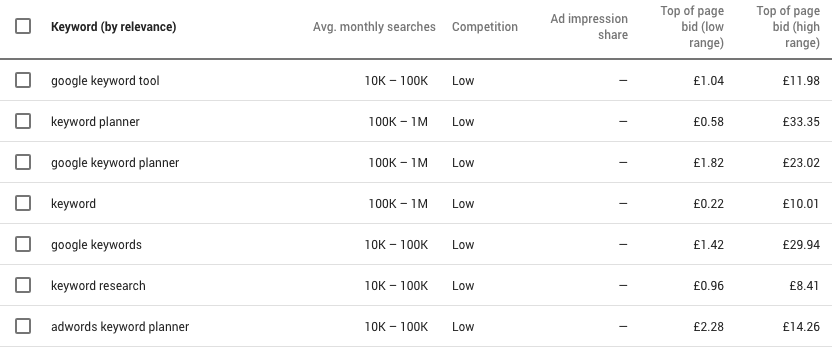
You can’t just go after keywords with the highest search volume in your industry.
Information like keyword competition and search intent is essential to help you select the right keywords for your business and guide you through creating high-quality content that has the potential to rank.
This all starts with the keyword suggestion tools you use.
So now, let’s get into the toolbox and dig out the best keyword research tools that will provide more keyword details to help you break down the first-page competition.
7 Keyword Suggestion Tools Recommendation
1. BiQ Keyword Intelligence + LiveKeyword
BiQ Keyword Intelligence is great for keyword discovery and suggestions. It provides a clean interface and is simply intuitive to use.
To get started, simply enter your seed keyword in the tool. You likely have a few keywords in mind that you would like to rank for.
As an example, let’s say we are researching the topic of video marketing. Input your keyword and select your geographical settings before clicking enter.
The tool will then return you with the keyword overview, which will give you a quick idea of keywords and potential search volume for the topic.
Underneath, you will find hundreds of related keyword ideas and their respective keyword details, including search volume, keyword trend, intent, competition, and value.
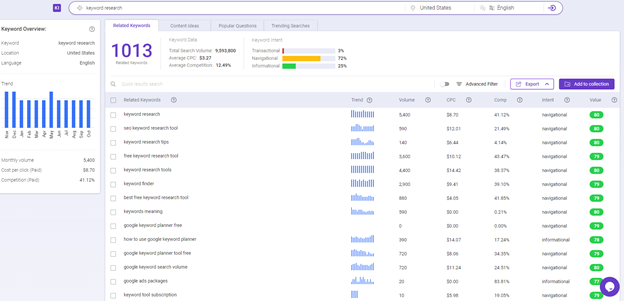
Note that this is just one view for a specific location; if you are targeting other locations, you can always open up a new tab to see a different set of keyword suggestions particular to the city and country.
Additionally, you can also use BiQ Keyword Intelligence to reveal relevant, profitable keywords by simply setting transactional intent and including specific keywords like video or marketing to find search terms containing a particular word.
In the process of discovering relevant keywords for your content, you will likely notice that the search volume for each keyword will vary greatly.
While you want to rank for terms that more audiences are searching for, in some cases, it may be more beneficial to target long-tail keywords with lower search volume because they have a more evident intention and are far less competitive.
Plus, make sure you also install Live Keywords, BiQ’s Chrome extension that allows you to access keyword information directly at Google search while analyzing the SERP.

2. Ahrefs Keyword Generator
As one of the complete keyword research tools out there, you can experiment with Ahrefs Keyword Explorer using their website keyword generator for free.
With Ahrefs Keyword Explorer, you will never run out of keyword ideas.
Aside from the thousands of keyword suggestions, Ahref also breaks down the first-page competition and provides useful click information that tells you how many people have clicked on the search result.
This is helpful to understand if the target keyword actually drives clicks or if there is a chance for you to outrank your competition by providing more relevant results.
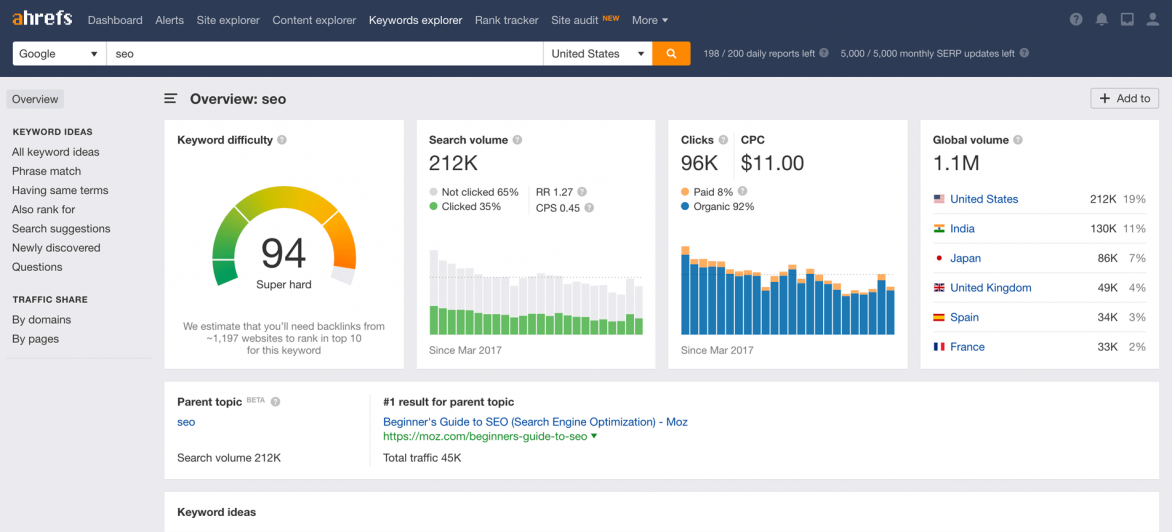
Still, our favorite part of the tool is its Keyword Difficulty Score. Because this feature lets you identify the low-hanging fruit among your keyword ideas and tells you how many backlinks you will need to rank on the first page of Google.
3. Answer the Public
Not just a simple autocomplete tool, Answer the Public is a fantastic tool that allows you to explore keywords from your prospects and the audiences’ point of view.
It expands your keywords into questions and problems, which will enable you to get a deeper level of understanding of your consumer insights and how people generally search around your topics.
From there, you can also experiment with seed keywords to discover more long-term search phrases or leverage the information as an outline of your content.
The tool is beneficial when building your cornerstone content and making sure you are creating a comprehensive piece that has answered the keyword intent.
4. LSIGraph
Another quick tip for finding more keyword suggestions is to look for their semantic keywords.
Semantic keywords are contextually-related keywords like synonyms, co-occurring terms, or implied words that you can use to increase your keyword density without falling into the trap of keyword stuffing.
LSIGraph is a powerful keyword tool designed to help you identify these semantically related terms to your primary keyword.
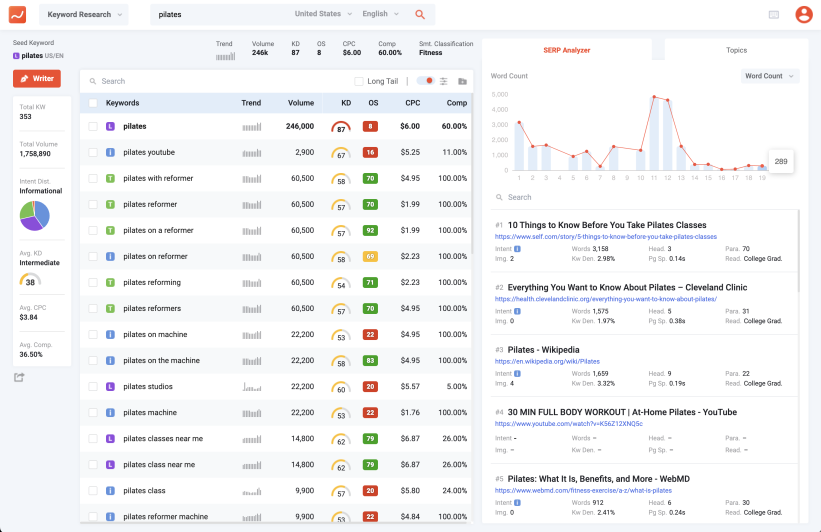
Simply visit the website and enter your target keyword to get a long list of similar phrases and terms to help you build your context.
Using semantic keywords in your content is one way to take your SEO copywriting to the next level, as the terms will build content relevance while avoiding overstuffing your keywords.
5. Soolve
A keyword research tool in a league of its own, Soolve is a free keyword research tool that provides keyword suggestions from multiple sources.
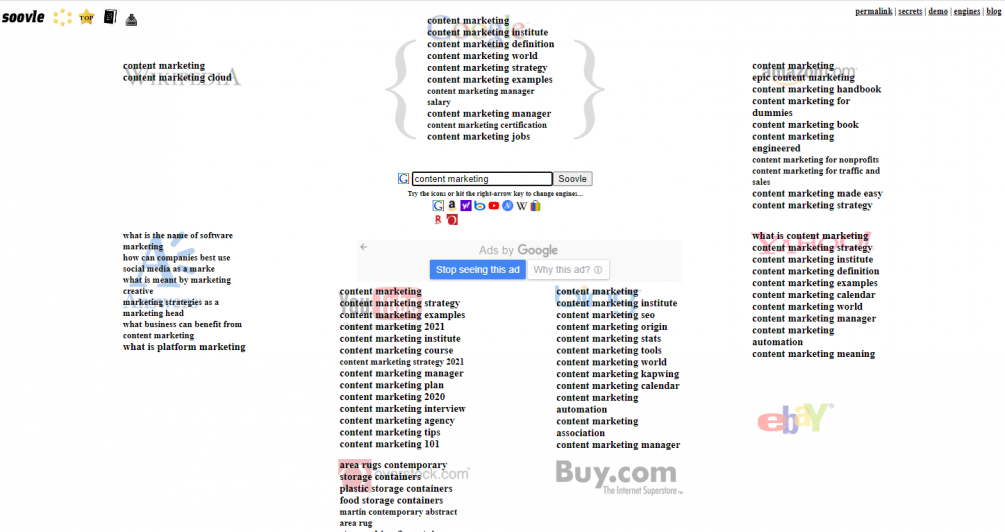
Just key in your primary seed keyword and Soolve will give you suggested keyword ideas from other search engines, including YouTube, Bing, Yahoo, Amazon, and more.
This easily lets you uncover many untapped keywords that your competition might not have otherwise considered.
6. Keyword Surfer
Another Chrome extension we recommend is Keyword Surfer.
Like Live Keywords, you will also get a list of keyword suggestions related to your search query and their search volume directly on your SERP.

However, a special feature is that you can customize your country settings on Keyword Surfer to see the local search volume result for 19 countries, including the United States, Canada, France, and Germany.
7. Google Search Console
Google Search Console isn’t a traditional keyword research tool. However, it is a unique tool that can give you access to the most related keyword suggestions for your website.
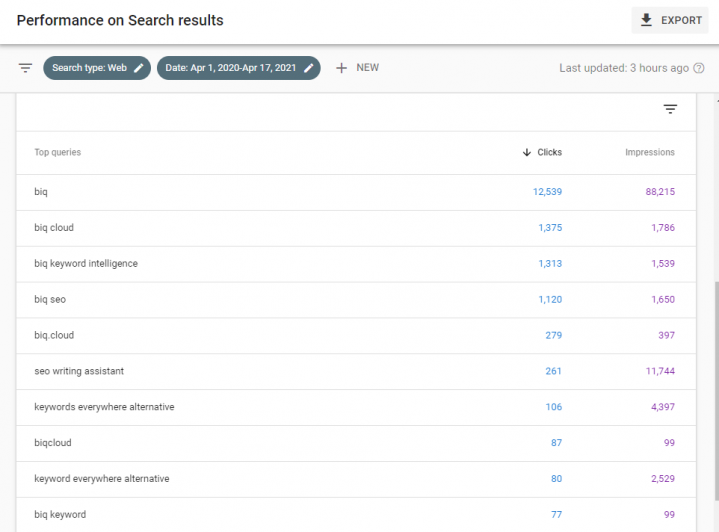
Just head to the Performance Report, and the tool will list out all the exact search terms your website shows impressions and get clicks from Google.
Chances are, you might find some incredible opportunity keywords where you are ranking between #8 to #20 for your content.
In this case, this content calls for a quick update and optimization to get a nice ranking boost.
This can be easily done by using BiQ Content Intelligence.
The tool will analyze your content and compare your content WordVector against the Top 10 ranking results for your target keyword to make sure you don’t have any missing content gaps.

You will also see a section-by-section analysis that gives you a glance of your content relevance, sentiment analysis, and readability which you can edit to improve further.
Overall, simply follow the suggestions provided and make sure your score is in green to have SEO-friendly content to boost your rankings!
Where To Find More Keywords?
And if that’s not enough, there’s one last resource where you can find more keywords, and that’s through analyzing your competitor’s rankings.
A competitive keyword analysis is one of the most effective ways to compete in a crowded space and gain a crucial advantage over other businesses in your industry.
You can quickly get your competitor’s keywords using tools like BiQ Rank Intelligence. Just simply insert your competitor’s website URL and set the tool to reveal the keywords ranking in the position ranging from #1 to #20 with a minimum search volume of 100.
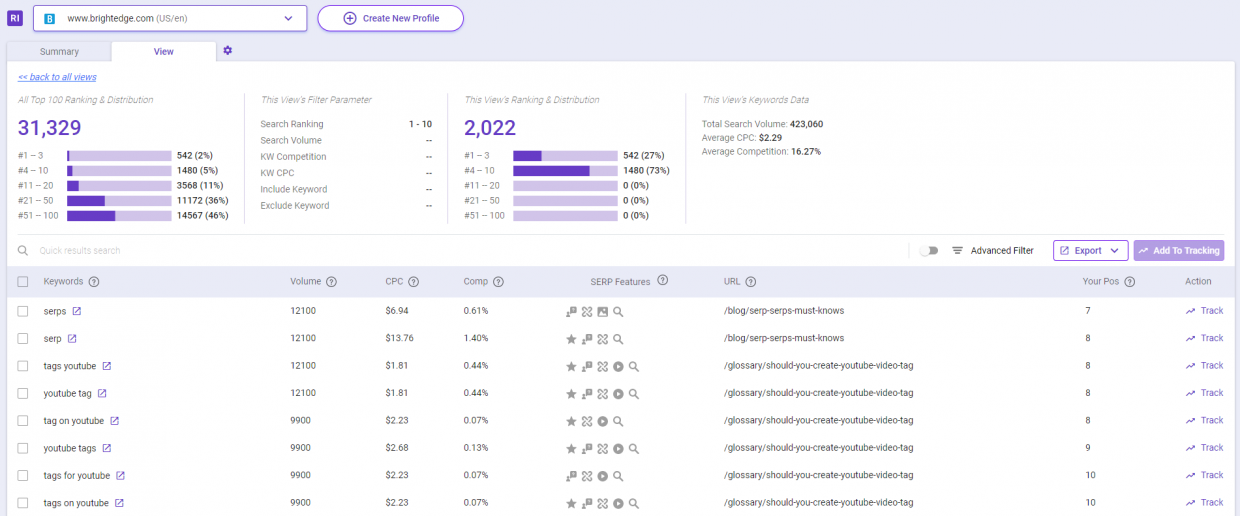
Do this for your Top 5 competitors and check if there are any potential keywords you might have missed or if you have any overlapping keywords that you might have a competitive edge over.
Target those high potential keywords first and analyze the SERP feature to see any featured snippet opportunities you can take advantage of.
Make sure you prioritize these low-hanging fruits first before creating new content for other relevant keywords in the niche.
Bonus: How to Use Your Keywords for SEO
Now that you have your list of target keywords, you need to put them to work to get the maximum SEO results.
Use keyword grouping and organization to plan your content silo and internal link structure. And when creating your content, make sure it is optimized for your target keyword.

Here are some essential suggestions when it comes to using your keywords for SEO.
- Write content naturally: The key to any great content is to write for humans first, so make sure you understand the search intent of your keyword and create content that addresses your target audience. A quick tip to making sure your content is easily understandable is always to draft a content outline beforehand.
- Optimize title and meta description: Including your keywords in your headline and description will help Google determine how relevant your content is to what people are searching for. Also, make sure your title and description are enticing while describing the benefits to persuade searchers to click through your search result and see the full content on your side.
- Add LSI/ related keywords: One of the most important places to optimize the use of SEO keywords is in your content. However, there’s a formula to getting it right. Avoid keyword stuffing that can hurt your search ranking. Include your primary keyword in the first and last paragraph of your content, and opt for keyword variations and related terms throughout your content.
- Use as image alt tag: You can’t afford to ignore image SEO. Ensure your images are relevant to your content and include your keywords in the alt text and image description.
- Include in Headings: Most audiences scan than reading, so make sure you have your keywords in your headings and subheadings to help convenient your readers and allow them to jump straight to the content they need. This may also appear as part of a featured snippet or answer box, so make sure it is optimized.
- URLs: The best URLs for both visitors and Google bots are ones that they understand. So remember to use your target keyword as your URL slug but keep it short and simple while avoiding keyword stuffing.
There you have it, the keyword suggestion tools and tips.
But to make the whole process easier and have peace of mind that your content is fully optimized, we would suggest checking your content with BiQ Content Intelligence.
Or better yet, write your content directly on our platform because the tool also supports real-time analysis while you are writing.
Conclusion
There’s no such thing as too many keyword suggestions.
Especially if you are a small business competing with massive brands, make sure you explore different free keyword research tools and metrics to help you expand your ranking portfolio.
Ultimately, understand that keyword research is a never-ending process, and you need to be on your toes to find and leverage keyword trends before anyone else can react.
Did we miss any other good free keyword suggestion tool? Let us know down in the comments below.




